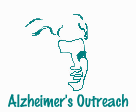 Stages
of Language Breakdown
Stages
of Language Breakdown
If you would like to print it out in plain text, click HERE
 Stages
of Language Breakdown
Stages
of Language Breakdown
If you would like to print it out in plain text, click HERE
Communicating
with an Alzheimer's patient is among the most difficult tasks a caregiver
faces as the disease progresses. The following addresses the gradual deterioration
of language abilities and stages in which they occur:
MEMORY
Early forgetful stages
1. Confused about time but not about places or persons.
2. Experiences mild loss of short-term memory which is not always apparent in everyday conversations.
Middle Stages
1. Confused about time and place, but not about person or self.
2. Experiences moderate loss of short-term memory.
3. Can't think of less common words or concepts and less familiar with names.
4. Can't remember three item lists or three step instructions.
Late stages
1. Is disoriented for time, place and person.
2. Can't form new memories.
3. Fails to recognize family members.
COMPREHENSION
Early forgetful stages
1. Has difficulty understanding complex conversations, anecdotes, rapid speech or speech in noisy or distracting environments.
2. Unable to detect humor and sarcasm.
3. Follows directions when clearly stated.
4. Understands written cues.
5. Understands facial expressions, gestures and other non-verbal emotional cues.
Middle stages
1. Has trouble understanding ordinary conversation.
2. Unable to process rapid speech.
3. Has difficulty focusing and maintaining attention; is distracted by noise, multiple speakers.
4. Requires repetition of simple directions.
5. Can read mechanically but does not understand meaning of what is read.
6. Misses facial cues but retains perception of emotional meaning.
Late stages
1. Fails to understand word meanings.
2. May be unaware of being spoken to.
LINGUISTIC SKILLS
Early forgetful stages
1. Has some problems in thinking of what to say.
2. Takes longer for all language processing.
3. Experiences mild naming difficulties; may use related words such as "sugar" for "salt".
4. Often self-corrects word errors.
5. Uses good grammar and diction.
Middle stages:
1. Has substantial loss of naming and word-finding abilities, especially for abstract or specific words..
2. Uses more and more "related words".
3. Processes ideas into words more slowly.
4. Can't relate ideas or events in order.
5. Uses jargon or "gibberish".
6. May endlessly repeat questions, words or ideas.
7. Uses relatively good grammar and diction.
Late stages:
1. May repeat incessantly or echo what others say.
2. May use poor grammar and diction.
3. May speak only in jargon or nonsense.
4. May be mute.
SOCIAL COMMUNICATION
Early forgetful stages:
1. Digress from topic in conversation.
2 Tends to repeat himself.
3. May ramble on and on.
4. Relies heavily on cliches.
5. Gets along adequately in most social situations.
Middle stages:
1. Makes vague, empty, irrelevant conversation.
2. Asks fewer questions.
3. Is excessively self-oriented.
4. Does not initiate conversation.
5. Repeats ideas over and over again.
6. Withdraws from difficult social situations.
Late stages:
1. Is no longer aware of social interaction or expectancies.
2. Withdraws partially or completely from communication.
Lincoln General Hospital (c) copyright 1996

Hope our logo helps you find your way back to us.